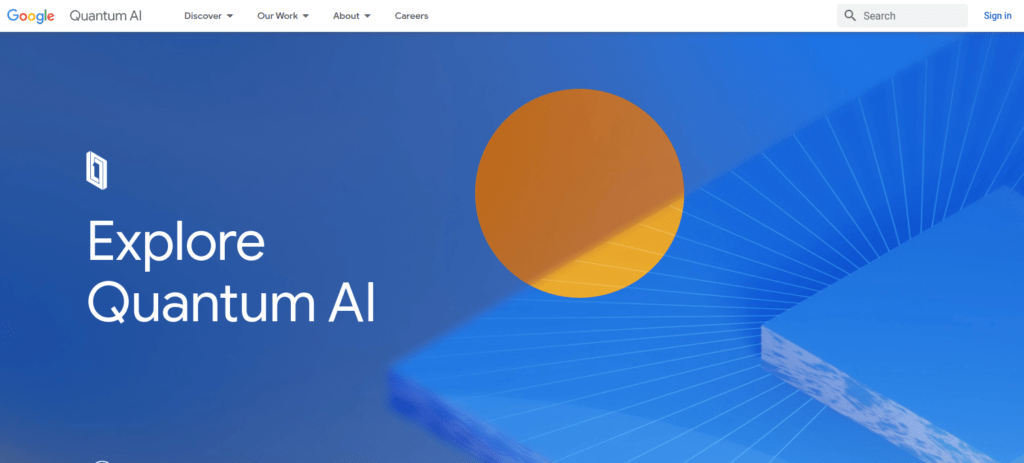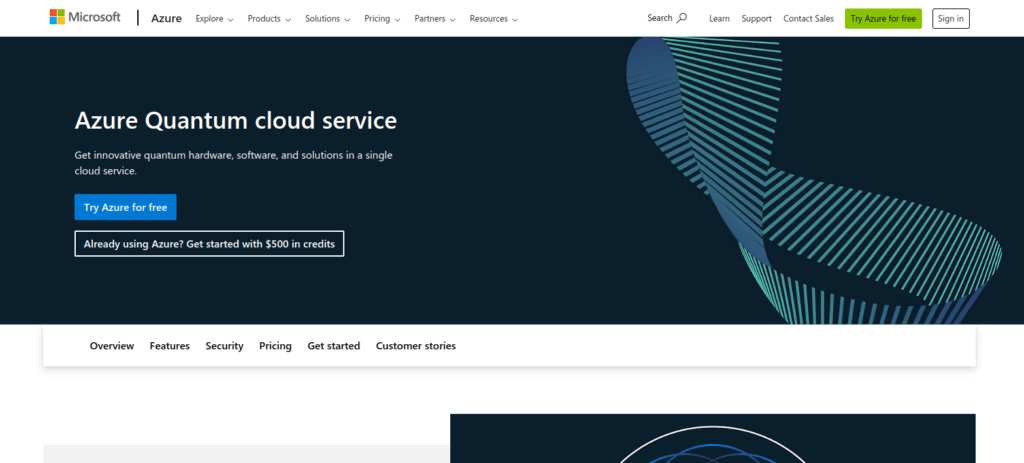QaaS Technology: Definition and Essential Benefits

Introduction
In the dynamic landscape of modern technology, a revolutionary advancement stands ready to transform the way we solve complex problems: QaaS technology. Imagine accessing the unparalleled power of quantum computing without the hefty investment in specialized hardware or expertise. Intrigued? You should be. QaaS technology promises not only to democratize quantum computing but to propel industries into new realms of efficiency and innovation. Envision solving previously unsolvable problems, optimizing processes at unimaginable speeds, and safeguarding data with unprecedented security.
This isn’t a distant future; it’s happening now. Dive into this blog to explore the extraordinary potential of QaaS technology and discover how it’s set to revolutionize the technological landscape. Get ready to embark on a journey that bridges the gap between the cutting-edge and the accessible, turning quantum dreams into tangible reality.
Table of Contents
What is Quantum-as-a-Service (Qaas Technology)?
Quantum-as-a-Service (QaaS technology) represents a pivotal evolution in computational capabilities, harnessing the principles of quantum mechanics to offer advanced computing power as a service. Unlike traditional computing, which operates using binary bits (0s and 1s), QaaS technology utilizes quantum bits, or qubits, which can exist in multiple states simultaneously due to phenomena like superposition and entanglement. This enables quantum computers to tackle complex problems exponentially faster than classical computers.
At its core, QaaS technology democratizes access to quantum computing resources, making them accessible via cloud platforms without the need for substantial investments in specialized infrastructure. Users can harness quantum algorithms and simulations to solve intricate mathematical equations, optimize complex logistical routes, or model molecular interactions for pharmaceutical research. This accessibility not only accelerates scientific discoveries and technological advancements but also fosters innovation across diverse industries, from finance and healthcare to materials science and cybersecurity.
The advent of QaaS technology marks a paradigm shift, promising to revolutionize problem-solving capabilities and drive forward the frontiers of scientific research and business optimization. As organizations increasingly seek to leverage quantum advantages, QaaS technology stands poised to redefine what’s possible in the digital era.
The advantages of Quantum-as-a-Service are manifold, positioning it as a catalyst for innovation and efficiency.
- Scalability and Accessibility: QaaS provides scalable access to quantum computing resources, making it feasible for businesses of all sizes to explore and utilize quantum technology. This accessibility breaks down barriers, allowing even small enterprises to leverage cutting-edge quantum capabilities.
- Cost-Efficiency: Traditional quantum computing infrastructure requires significant financial investment. QaaS mitigates these costs by offering quantum computing power on a pay-per-use basis. This model is especially beneficial for startups and research institutions with limited budgets.
- Accelerated Problem Solving: Quantum computers excel at solving complex problems that are intractable for classical computers. From optimizing supply chains to simulating molecular structures for drug discovery, QaaS can expedite solutions to some of the most challenging problems faced by industries today.
- Enhanced Security: Quantum computing holds the promise of revolutionizing cryptography. Quantum encryption methods could potentially create virtually unbreakable codes, enhancing data security and protecting sensitive information from cyber threats.
- Fostering Innovation: By lowering the entry barriers, QaaS encourages experimentation and innovation. Researchers and developers can test new quantum algorithms and applications, driving forward the frontiers of knowledge and technology.
Qaas Technology (Quantum-as-a-Service) Providers
Several tech giants and innovative startups are leading the charge in providing QaaS solutions, each bringing unique strengths and capabilities to the table.
IBM Quantum

IBM Quantum stands at the forefront of QaaS technology, offering a pioneering platform that democratizes access to quantum computing resources. At its core, IBM Quantum provides users with cloud-based access to a variety of quantum processors and simulators. Through its Quantum Experience platform, IBM facilitates hands-on exploration of quantum computing principles, allowing researchers and developers to experiment with quantum algorithms and applications in a sandbox environment. IBM’s commitment to advancing quantum computing is evident in its continuous development of quantum hardware and software tools, aimed at solving complex problems that are beyond the reach of classical computers.
Key features of IBM Quantum include:
- Quantum processors: Variants of quantum chips such as IBM Q System One.
- Qiskit: IBM’s open-source quantum computing software framework.
- Community and education: Resources for learning and collaboration in quantum computing.
Google Quantum AI

Google Quantum AI stands as a beacon of innovation in the realm of QaaS technology, pushing the boundaries of what’s possible with quantum computing. At its core, Google’s Quantum AI division focuses on developing quantum processors capable of achieving quantum supremacy—the ability to solve problems beyond the capabilities of classical computers. Central to Google’s quantum efforts is its Sycamore processor, a quantum chip designed to demonstrate quantum supremacy by performing calculations in minutes that would take classical supercomputers millennia.
Key aspects of Google Quantum AI include:
- Quantum processors: Leading-edge quantum hardware like the Sycamore processor.
- Quantum algorithms: Development of algorithms optimized for quantum systems.
- Collaborations: Partnerships with academic institutions and industry leaders to advance quantum research.
Through its cloud platform, Google Cloud, Google Quantum AI offers QaaS technology, providing researchers and developers access to quantum computing resources to explore new frontiers in fields such as chemistry, materials science, and machine learning. As quantum computing continues to evolve, Google Quantum AI remains at the forefront, driving innovation and reshaping the future of computing.
Microsoft Azure Quantum

Microsoft Azure Quantum represents a significant leap forward in the realm of QaaS technology, offering a robust platform that integrates quantum computing capabilities with Microsoft’s Azure cloud services. At its core, Azure Quantum provides users with access to a diverse ecosystem of quantum hardware, software, and solutions, empowering businesses and researchers to harness the power of quantum computing without the complexities of managing specialized infrastructure.
Key components of Microsoft Azure Quantum include:
- Quantum hardware: Collaboration with leading quantum hardware providers to offer a variety of quantum processors.
- Quantum software: Tools and libraries optimized for developing and simulating quantum algorithms.
- Development environment: Integration with familiar tools like Visual Studio for seamless quantum application development.
Through Azure Quantum, organizations can explore and experiment with QaaS technology to tackle complex problems in fields such as cryptography, optimization, and machine learning. Microsoft’s commitment to advancing quantum computing ensures that Azure Quantum remains a pivotal platform for driving innovation and shaping the future of computational capabilities.
D-Wave Systems

D-Wave Systems stands out in the realm of QaaS technology with its unique approach to quantum computing through quantum annealing. At the heart of D-Wave’s offering is its Leap platform, which provides access to quantum processing units (QPUs) designed specifically for solving optimization problems.
Key features of D-Wave Systems include:
- Quantum annealing: Utilizing quantum effects to find the optimal solution to complex optimization challenges.
- Leap platform: A cloud-based service that allows users to run quantum applications and algorithms on D-Wave’s QPUs.
- Hybrid solvers: Integration with classical computing techniques to enhance the efficiency and effectiveness of quantum algorithms.
D-Wave’s quantum annealing approach differs from gate-based quantum computing, focusing on finding the lowest energy state of a system to solve optimization problems. This makes D-Wave systems particularly suitable for industries such as logistics, finance, and materials science, where optimization plays a crucial role in decision-making processes. As quantum computing continues to evolve, D-Wave Systems remains a key player, offering innovative solutions that leverage the power of QaaS technology to address real-world challenges.
Applications of Quantum-as-a-Service
The potential applications of QaaS span numerous industries, promising to transform how we approach and solve problems.
- Financial Services: Quantum algorithms can optimize trading strategies, manage risk, and enhance fraud detection. QaaS enables financial institutions to perform complex calculations more efficiently, leading to better decision-making and improved financial outcomes.
- Logistics and Supply Chain Management: Quantum computing can optimize logistics and supply chain operations by solving complex routing and scheduling problems. QaaS helps companies streamline operations, reduce costs, and improve delivery times.
- Cryptography and Cybersecurity: Quantum encryption methods offer unprecedented levels of security. QaaS providers are developing quantum-safe cryptographic algorithms to protect sensitive data from emerging cyber threats.
- Material Science: QaaS allows researchers to model and simulate new materials at the quantum level, leading to breakthroughs in developing stronger, lighter, and more efficient materials for various applications.
Conclusion
In conclusion, QaaS technology stands as a beacon of innovation and promise in the realm of computing. Its ability to harness the power of quantum mechanics through accessible cloud-based platforms heralds a new era of possibilities. As businesses and researchers delve deeper into the potential of QaaS technology, they uncover avenues for solving previously insurmountable challenges, optimizing operations with unparalleled efficiency, and driving forward scientific discovery.
The future of QaaS technology holds immense potential across various sectors, from healthcare and finance to cybersecurity and materials science. By democratizing access to quantum computing resources, QaaS technology empowers organizations of all sizes to explore, experiment, and innovate without the constraints of traditional computing limitations. As advancements in quantum algorithms and hardware continue to evolve, QaaS technology promises to redefine what constitutes cutting-edge computational capability, paving the way for transformative breakthroughs in technology and beyond.
FAQs about QaaS technology:
- What is QaaS technology? QaaS (Quantum-as-a-Service) technology allows users to access quantum computing resources via the cloud, enabling them to leverage quantum capabilities without investing in specialized hardware.
- How does QaaS technology work? QaaS platforms provide remote access to quantum processors and simulators. Users can submit quantum algorithms and receive results through a cloud-based interface.
- What are the benefits of using QaaS technology? QaaS technology offers scalability, cost-efficiency, and access to cutting-edge quantum computing power for solving complex problems faster than traditional computers.
- Who can benefit from QaaS technology? Businesses, researchers, and developers across various industries can benefit from QaaS technology to innovate in fields such as finance, healthcare, cybersecurity, and materials science.
- Which companies provide QaaS technology services? Major tech companies like IBM, Google, Microsoft, and D-Wave Systems offer QaaS platforms, each with unique features and capabilities tailored to different applications.





Thanks, I have just been looking for information about this subject for a long time and yours is the best I’ve discovered till now. However, what in regards to the bottom line? Are you certain in regards to the supply?
Thank you for sharing your precious knowledge. Just the right information I needed. By the way, check out my website at UY9 about Website Promotion.
nenarazili jste někdy na problémy s plagorismem nebo porušováním autorských práv? Moje webové stránky mají spoustu unikátního obsahu, který jsem vytvořil.
Díky moc!|Hej, jeg synes, dette er en fremragende blog. Jeg snublede over det;
nogensinde løbe ind i problemer med plagorisme eller krænkelse af ophavsretten? Mit websted har en masse unikt indhold, jeg har
) Jeg vil besøge igen, da jeg har bogmærket det. Penge og frihed er den bedste måde at ændre sig på, må du være rig og
skupině? Je tu spousta lidí, o kterých si myslím, že by se opravdu
webside er virkelig bemærkelsesværdig for folks oplevelse, godt,
at web, except I know I am getting familiarity all the time by reading thes pleasant posts.|Fantastic post. I will also be handling some of these problems.|Hello, I think this is a great blog. I happened onto it;) I have bookmarked it and will check it out again. The best way to change is via wealth and independence. May you prosper and never stop mentoring others.|I was overjoyed to find this website. I must express my gratitude for your time because this was an amazing read! I thoroughly enjoyed reading it, and I’ve bookmarked your blog so I can check out fresh content in the future.|Hi there! If I shared your blog with my Facebook group, would that be okay? I believe there are a lot of people who would truly value your article.|منشور رائع. سأتعامل مع بعض هذه|
Good day! Would you mind if I share your blog with my myspace group? There’s a lot of people that I think would really enjoy your content. Please let me know. Thanks
Tak skal du have!|Olá, creio que este é um excelente blogue. Tropecei nele;
på grund af denne vidunderlige læsning !!! Jeg kunne bestemt virkelig godt lide hver eneste lille smule af det, og jeg
Heya i am for the first time here. I found this board and I find It truly useful & it helped me out a lot. I hope to give something back and help others like you helped me.
Hmm is anyone else encountering problems with the images on this blog loading? I’m trying to find out if its a problem on my end or if it’s the blog. Any feedback would be greatly appreciated.
vykřiknout a říct, že mě opravdu baví číst vaše příspěvky na blogu.
det. Denne side har bestemt alle de oplysninger, jeg ønskede om dette emne, og vidste ikke, hvem jeg skulle spørge. Dette er min 1. kommentar her, så jeg ville bare give en hurtig
pokračovat v tom, abyste vedli ostatní.|Byl jsem velmi šťastný, že jsem objevil tuto webovou stránku. Musím vám poděkovat za váš čas
Podem recomendar outros blogues/sites/fóruns que tratem dos mesmos temas?
Can you be more specific about the content of your article? After reading it, I still have some doubts. Hope you can help me.
супрастин таблетки инструкция по применению цена взрослым https://allergiano.ru/ .
The very heart of your writing while sounding agreeable initially, did not really work perfectly with me after some time. Someplace throughout the sentences you actually were able to make me a believer but only for a while. I still have a problem with your leaps in logic and one might do well to fill in those breaks. When you actually can accomplish that, I will certainly be amazed.
I think this web site has got some rattling good info for everyone :D. “Nothing great was ever achieved without enthusiasm.” by Ralph Waldo Emerson.
Saved as a favorite, I really like your blog!